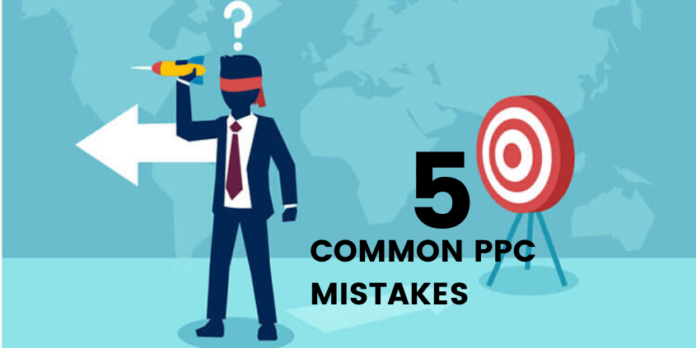Make sure to stay away from the 10 most common mistakes in a PPC campaign or risk whatever goal you are striving for. Keep reading to know more!
As PPC marketing has become increasingly common in recent years, it is hard to imagine that any company has yet to try this tactic. However, due to its popularity and the promise of immediate results, many untrained digital marketers have attempted to make a move. Unfortunately, they usually wreck the entire campaign by making novice mistakes.
If you are also new to the world of PPC marketing and would try to test it out, make sure you understand the following don’ts and stay away from them. Let’s have a look below and see what they are!
1. Setting up unrealistic goals
When first organizing a PPC campaign, it is natural for businessmen to desire the top ad placement. Regardless of which ad platform we are talking about, the #1 position on the search result page is a trophy that guarantees to bring back quality leads, higher chances of converting new customers, and more visibility for potential shoppers.
The thing is, top ad placement is usually taken by giant brand names, who have invested a lot of time, money, and effort. For start-up or medium stores, it is not worth trying to compete in vain. Furthermore, high-volume keywords can cost anywhere from $6 to $10 per click, undoubtedly too much for the budget.
Thus, if you want the campaign to pan out as expected, do not hype your hopes up in the first place. Instead, be critical and down-to-earth about what you can do within the capacity.
2. Failing to keep track of the process
Once the campaign is in motion, many people tend to leave it there and hope that the ads will run on themselves. This cannot be further from the truth. Digital marketers need to supervise the entire procedure and gather the necessary metrics closely.
If you do not know where to look at the campaign report, consider asking a PPC agency for in-depth advice on which metrics to pay attention to and which metrics you can safely put aside.
The metrics usually include the number of impressions, clicks, clickthrough rate, conversion rate, etc. Such measures are pivotal, as they allow you to analyze the performance of a PPC campaign and decide whether things are going smoothly. Being constantly updated on the status of your ads grants you more freedom and control when it comes to quality management.
For example, by looking at the daily report of your PPC ads, you realize that the leads usually bounce, leading to no concrete conversion at all. From there, you can quickly pinpoint where the problem lies and suggest practical solutions to gear everything back on track.
3. Forgetting to include ad extensions
Ad extensions are often overlooked, even by the most experienced digital marketers. When used correctly, ad extensions can provide the target audience with valuable information concerning your business, and you do not have to pay for these extra lines!
Below are some of the most popular extensions that you should incorporate into a PPC ad.
- Price extension: Here, you can put an estimated price range of the products available on your landing page.
- Call extension: Insert your company’s phone number and give a reminder about the available time (during working hours only or 24/7.)
- Structured snippet extensions: This feature means you can create clickable subheadlines under the main headline. Accompanied by a brief description, it enables users to scan through the content of your landing page within seconds.
- Location extension: If you own a mortar-and-brick business, make sure to tell customers where your headquarters are.
A typical ad consists of only the title and the meta description. If it appears too short and does not take up much space, drawing users’ attention tends to be much more difficult. That is why putting in a few extensions to enrich the ad is required.
4. Not using negative keywords
Telling the ad platform what your products are like will not be enough. You have to emphasize what they are not. This is when negative keywords come in handy.
When you use negative keywords in your bidding, the host engine will not display your ads to searches that match the phrases. In other words, feel free to let negative keywords weed out low-quality leads, allowing your ads to focus on the right target audience.
For example, your key products are upscale golden jewelry, and you want to aim at wealthy female users who are interested in designer accessories. To ensure that your ads will not pop up to someone outside the expected group of customers, you choose “cheap jewelry,” “free golden jewelry,” or “affordable golden jewelry” as the main negative keywords.
As a result, your sponsored posts will not bother those taking no interest in buying your products.
5. Showing ads non-stop
Featuring a PPC ad for a long time can cost a lot of money, and it usually fails to be at peak performance all day long. Therefore, you should look for a golden moment when ads are more likely to deliver the best outcomes and stick to it.
For example, the number of Internet surfers tends to soar before 9 am and within 7-9 pm. So instead of stretching the ads across 24 hours with lower visibility, concentrate all of your resources on a few precious periods to maximize the work.
What is more, most ad platforms provide you with an automated scheduling tool. So you can easily set up everything from days before and let the ads self-run.
Conclusion
Optimizing a PPC campaign requires many skills and expertise, which can be challenging to achieve for novice businessmen. If you keep making mistakes with your PPC strategies and would like to have professional help, check out Olifant Digital and see what this reliable agency has to offer!












